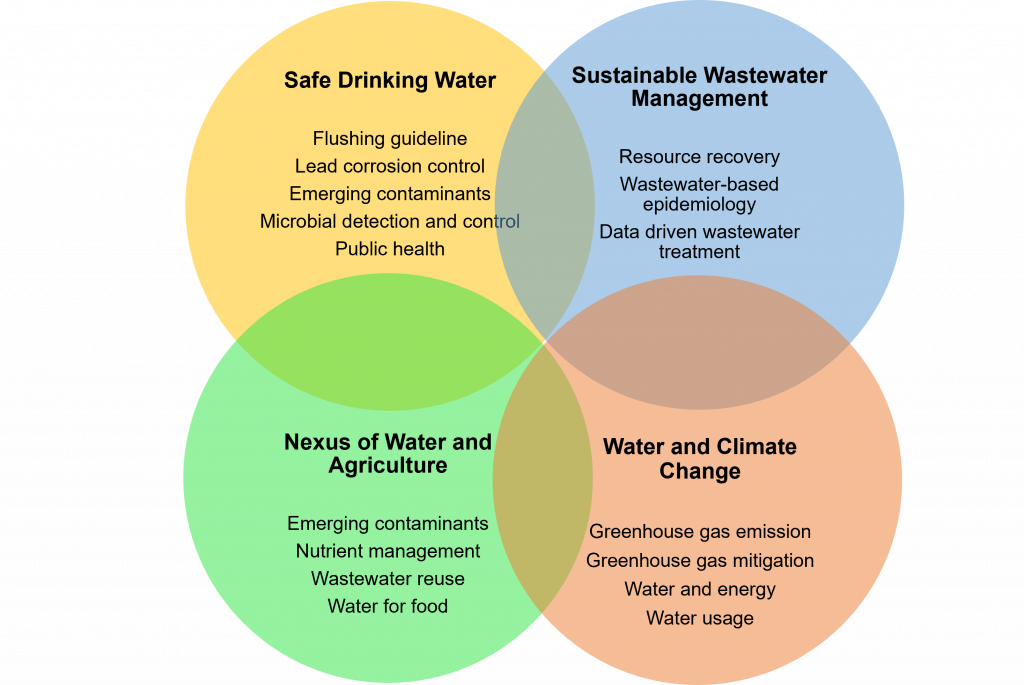CWI supports both fundamental and applied research to develop advanced technologies and strategies for improving the efficiency of water and wastewater treatment and recovering valuable resources from wastewater.

Examples of Current Research Projects
Considerations and blending strategies for drinking water system integration with alternative water supplies: The research led by Daniel Giammar is focused on on successful introduction of new supplies to maintain distribution system water quality. The work will identify methods (startup strategies, blending targets) to mitigate the potential issues (corrosion, biological regrowth, nitrification, premise plumbing pathogens, aesthetics) that may be associated with integrating these highly treated supplies into existing drinking water systems. Funded by Water Research Foundation.
Novel Mineral-Hydrogel Composites for Effective Nutrient Removal to Manage Harmful Algal Blooms: Harmful algal blooms (HABs) not only threaten industries like fisheries and tourism, but also affect public health by producing cyanobacterial toxins. To address the growing concerns caused by HABs, Young-Shin Jun and Yinjie Tang propose to develop novel calcium alginate hydrogel composites seeded with calcium phosphate (Ca-Alg/CaP) that effectively remove and recover phosphorus (P) and nitrogen (N). Funded by the U.S. Environmental Protection Agency.
Abiotic degradation of emerging RNA interference pesticides: Modern agriculture employs a variety of tools to increase food production to meet the growing demands of the world’s population. This has resulted in increasing need for efficient and effective fertilizers and pesticides. In this NSF CAREER project, Kimberly Parker will assess key degradation processes that determine the environmental fate of emerging pesticides that use double-stranded RNA (dsRNA) as their active agent. Funded by National Science Foundation.
Enhancing Resource Recovery and Improving Wastewater Reuse Through Synergistic Cooperation Between Bioelectrochemical Systems and Forward Osmosis: This collaborative project between WashU (Jason He) and Alexandria University (Salah Hassouna) aims to develop an innovative wastewater treatment system to enhance resource recovery and wastewater reuse. The recovered resource includes bioenergy, nitrogen, and high-quality water for reuse. Funded by U.S.-Egypt Science and Technology Joint Fund (19th Cycle).
National Alliance for Water Innovation: As part of the overall $100 million effort to pursue early stage research and development to enable greater use of non-traditional water sources, Daniel Giammar is serving as the lead cartographer for municipal wastewater as a non-traditional source. He is contributing to a technology roadmap and performing a baseline study of existing facilities. Funded by Department of Energy.
Wastewater Counts: Real-time de facto Population Estimation for Quantitative Wastewater-based Epidemiology: Wastewater-based epidemiology (WBE) has emerged as a complementary approach to existing clinical tools to track the spread of infectious disease. In this NSF CAREER project, Fangqiong Ling is to address this critical challenge through the development of computational approaches, models, and tools to accurately predict the size of a disease outbreak from wastewater biomarker data. Funded by National Science Foundation.